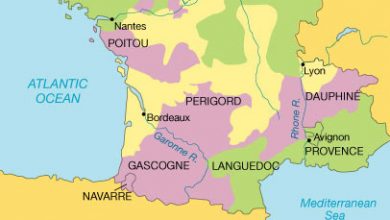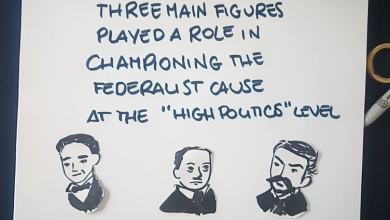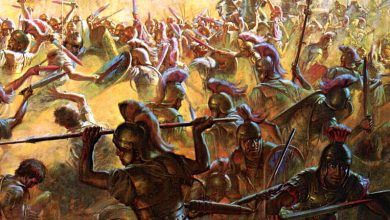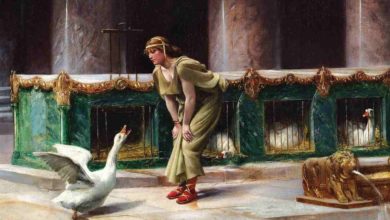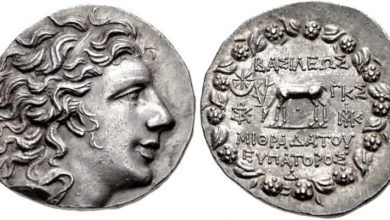On this day in 1933: Adolf Hitler becomes Chancellor of the German Reich

On this day in 1933, Adolf Hitler is sworn in as Chancellor of Germany. This is a seminal and much-discussed event in European history, and its consequences are known to all: namely the establishment of a National Socialist dictatorship in Germany, and the Second World War. With that in mind, in order to fully understand this event and its ramifications, indeed why it even took place, we have to start much sooner: the end of the First World War and the birth of the Weimar Republic.
The Birth of Weimar
The Weimar Republic was born from a troubled constellation of events: the defeat of the imperial army, the November revolution of 1918 against the Hohenzollerns, and the hopes of German Liberals and Social Democrats contributed to the creation of a new political system.
The name Weimar derived from the city in which its constitution was written and promulgated in August 1919. While the constitution was being debated, the republic, headed by the Social Democrats, accepted the humiliating terms of the Versailles Treaty. Although its officials had signed only under the threat of an Allied invasion, the republic was nevertheless permanently associated with the national disgrace and the economic burdens of the treaty.
Difficulties for the Republic

Throughout the 1920s the government of the republic was required to fulfill the economic and military provisions imposed by the Paris settlement. It became all too easy for nationalists and military figures whose policies had brought on the tragedy and defeat of the war to blame the young republic and the Socialists for the results of the conflict. In Germany, more than in other countries, the desire to revise the treaty was closely related to a desire to change the mode of domestic government.
The new government suffered major and minor humiliations as well as considerable economic instability. In March 1920 the right-wing Kapp Putsch, or armed insurrection, erupted in Berlin, with the ultimate goal being to undo the republic that had been proclaimed after the November Revolution in 1918.
Led by a conservative civil servant and supported by army officers, the attempted coup failed, but only after government officials had fled the city and workers had carried out a general strike. In the same month, strikes took place in the Ruhr mining district. The government sent in troops. Such extremism from both the left and the right would haunt the republic for all its days. In May 1921 the Allies presented a reparations bill for 132 billion gold marks, which the German Republican government accepted only after new Allied threats of occupation. Throughout the early 1920s there were numerous assassinations or attempted assassinations of important Republican leaders, and violence was the hallmark of the first five years of the republic.

Inflation brought on the major crisis of this period. The financing of the war and continued postwar deficit spending generated an immense rise in prices. Consequently, the value of German currency fell. By early 1921 the German mark traded against the American dollar at a ratio of 64 to 1, compared with a ratio of 4,2 to 1 in 1914. The German financial community contended that the value of the currency could not be stabilized until the reparations issue had been solved. In the meantime, the printing presses kept pouring forth paper money, which was used to redeem government bonds as they fell due.
The French invasion of the Ruhr in January 1923, to secure the payment of reparations, and the German response of passive economic resistance produced cataclysmic inflation. The Weimar government paid subsidies to the Ruhr labor force, who had laid down their tools. Unemployment soon spread from the Ruhr to other parts of the country, creating a new drain on the treasury and also reducing tax revenues. The printing presses by this point had difficulty providing enough paper currency to keep up with the daily rise in prices. Money was literally not worth the paper it was printed on. The moral and social values of thrift and prudence were thoroughly undermined. Middle-class savings, pensions, and insurance policies were wiped out, as were investments in government bonds. Only when the social and economic upheaval of these months is grasped can one understand the later German desire for order and security at almost any cost. And with that said, let us begin with the man of the hour: Adolf Hitler.
Hitler’s political beginnings

Late in 1923 Adolf Hitler (1889 – 1945) made his first significant appearance on the German political scene. The son of a minor Austrian customs official, he had gone to Vienna, where his hopes of becoming an artist were soon dashed. He lived off money sent by his widowed mother and later off his Austrian orphan’s allowance. He also painted postcards for further income and later found work as a day laborer.
In Vienna he encountered Mayor Karl Lueger’s (1844 – 1910) Christian Socialist Party, which prospered on an ideology of anti-Semitism and from the social anxieties of the lower middle class. Hitler absorbed the rabid German nationalism and extreme anti-Semitism that flourished in Vienna. He came to hate Marxism, which he associated with Jews. During World War I Hitler fought in the German army, was wounded, rose to the rank of corporal, and won the Iron Cross for bravery.
After the conflict, Hitler settled in Munich. There he became associated with a small nationalistic, anti-Semitic political party that in 1920 adopted the name of National Socialist German Workers Party (NSDAP). In the same year the group began to parade under a red banner with a black swastika. It issued a platform, or program, of Twenty-Five Points. Among other things, this platform called for the repudiation of the Versailles Treaty, the unification of Austria and Germany, the exclusion of Jews from German citizenship, agrarian reform, the prohibition of land speculation, the confiscation of war profits, state administration of the giant cartels, and the replacement of department stores with small retail shops. Originally the Nazis had called for a broad program of nationalization of industry in an attempt to compete directly with the Marxist political parties for the vote of the workers.
Rebranding Socialism
As the tactic failed, the Nazis redefined the meaning of the word “socialist” in the party name, so that it suggested a nationalistic outlook. In 1922, Hitler said: “Whoever is prepared to make the national cause his own to such an extent that he knows no higher ideal than the welfare of his nation; whoever had understood our great national anthem ‘Deutschland, Deutschland, über alles’, to mean that nothing in the wide world surpasses in his eyes the German, people and land, land and people – that man is a Socialist”.
This definition, of course, had nothing to do with traditional German socialism. The “socialism” that Hitler and the Nazis had in mind was not state ownership of the means of production but the subordination of all economic enterprise to the welfare of the nation. It often implied protection for small economic enterprises. Increasingly, the Nazis discovered their party appealed to virtually any economic group that was at risk and under pressure. They often tailored their messages to the particular local problems these groups confronted in different parts of Germany.
Failed Rebellion

The social and economic turmoil following the French occupation of the Ruhr and the German inflation gave the fledgling party an opportunity for direct action against the Weimar Republic, which seemed incapable of providing military or economic security.
On 9 November, 1923, Hitler and a band of followers, accompanied by General Erich Ludendorff (1865 – 1937), attempted an unsuccessful putsch at a beer hall in Munich. When the local authorities crushed the rising, sixteen Nazis were killed. Hitler and Ludendorff were arrested and tried for treason. The general was acquitted.
Hitler used the trial to make himself into a national figure. In his defense, he condemned the republic, the Versailles Treaty, the Jews, and the weakened condition of his adopted country. He was convicted and sentenced to five years in prison, but he spent only a few months in jail before being paroled. During this time, he dictated Mein Kampf, but another result of his imprisonment was his decision to seize political power by legal methods.
A Brighter Future Halted

Throughout the rest of the 1920s, the Weimar Republic slowly, but steadily stabilized, helped greatly by the diplomatic skill of Gustav Stresemann (1878 – 1929) who saw the implementation of the Young and Dawes Plans, in which the Americans persuaded Belgium, France, and England to write off most of their economic claims on Germany and extend the deadline for the rest until into the 1980s.
In the meantime, Germany was allowed to float loans on the New York and London Stock Exchanges at low interest. At Locarno, also overseen by Stresemann, the Germans were promised territorial integrity and England compelled France to accept that she could not invade the Rhineland again to force payment from Germany. Continued prosperity and diplomatic success might have won the loyalty of the German people for the Weimar Republic and its moderate revisionism, but the Great Depression of the 1930s brought new forces to power.
The outflow of foreign, and especially American, capital from Germany that began in 1928 undermined the economic prosperity of the Weimar Republic. The resulting economic crisis brought parliamentary government to a halt. In 1928 a coalition of center parties and the Social Democrats governed. All went reasonably well until the Depression struck. Then the coalition partners differed sharply on economic policy, and the coalition dissolved in March 1930. To resolve the parliamentary deadlock in the Reichstag, President von Hindenburg appointed Heinrich Brüning (1885 – 1970) as chancellor. Lacking a majority in the Reichstag, the new chancellor governed through emergency presidential decrees, as authorized by Article 48 of the consitution. The Weimar Republic was transformed into a presidential dictatorship.

Rise of National Socialism
With the rise of mass unemployment, Nazi power in the streets also rose. Thousands of unemployed men joined the Nazi stormtroopers, which had 100 000 members in 1930 and almost 1 million in 1933. The Sturm Abteilung (SA) freely and viciously attacked Communists and Social Democrats. For the Nazis, politics meant the capture of power through terror and intimidation as well as through elections.
For two years, Brüning continued to govern through the confidence of von Hindenburg. The economy did not improve, and the political situation deteriorated. In 1932 the 83-year old president stood for reelection. Hitler ran against him and forced a runoff. The Nazi leader garnered 30,1% of the vote in the first election and 36,8% in the second. Although von Hindenburg was returned to office, the vote convinced him that Brüning had lost the confidence of conservative German voters. In May 1932 he dismissed Brüning and appointed Franz von Papen (1878 – 1969) in his place.

The new chancellor was one of a small group of extremely conservative advisers on whom the aged von Hindenburg had become increasingly dependent. von Papen and the circle around the president wanted to draw the Nazis into cooperation without giving Hitler effective power. The government needed the popular support of the right that only the Nazis seemed able to generate. The von Hindenburg circle decided to convince Hitler that the Nazis could not come to power on their own.
Franz von Papen removed the ban on Nazi meetings that Brüning had imposed and then called a Reichstag election for July 1932. The Nazis won 230 seats and polled 37,2% of the vote. Hitler would only enter the Cabinet if he were made chancellor, something von Hindenburg refused.
Another election was called in November, in which the Nazis gained only 196 seats, and was down to 33,1%, and Hitler was still refused the post of chancellor. In early December von Papen resigned, and General Kurt von Schleicher (1882 – 1934) became chancellor. People were now afraid of civil war between the extreme left and the far right. von Schleicher decided to try and fashion a broad-based coalition of conservative groups and trade unionists.
The prospect of such a coalition, including groups from the political left, frightened the von Hindenburg circle even more than the prospect of Hitler. They did not trust von Schleicher’s motives, which had never been clear. Consequently, they persuaded von Hindenburg to appoint Hitler chancellor. To control him and see that he did little mischief, von Papen was named vice chancellor, and other traditional conservatives were appointed to the Cabinet. On 30 January, 1933, Adolf Hitler became the chancellor of Germany, and just a little over 6 years later, he would plunge Europe into another World War, holding supreme power in the country that attempted to control him via politics.

